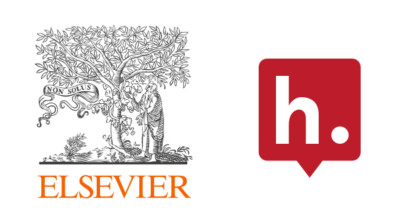Elsevier Collaborates With Hypothesis to Integrate Open Annotation
 Today, Elsevier and Hypothesis are announcing a collaboration to align annotation capabilities in Elsevier’s Research Products with the emerging ecosystem of interoperable clients and services for annotation based on open standards and technologies.
Today, Elsevier and Hypothesis are announcing a collaboration to align annotation capabilities in Elsevier’s Research Products with the emerging ecosystem of interoperable clients and services for annotation based on open standards and technologies.
Hypothesis is dedicated to the development of open annotation. Through its new open-source technology, academics and scientists are able to make notes on documents they are reading and share those notes with others. Elsevier is a world leading information analytics business specializing in science and health.
By working together, Elsevier and Hypothesis demonstrate two important shifts in scholarly communications: first, the growing role that annotation plays within the life cycle of research and publication; and second, that data standards and open frameworks are increasingly essential to scientific collaboration and progress.
“We know how essential annotation is to the daily workflow of researchers. Mendeley users have made hundreds of millions of annotations and Hypothesis users have been annotating SSRN and ScienceDirect content for years. Annotation is quickly becoming a required part of the larger researcher ecosystem. Hypothesis’ leadership and commitment to this space, best in class functionality, and open source technology made them the obvious choice to work with as we invest in our products to better support the research community,” said Olivier Dumon, Managing Director of Research Products at Elsevier.
Heather Staines, Director of Partnerships at Hypothesis said, “While the consensus achieved by the W3C Web Annotation standards recommendation last year was an essential first step, widespread adoption of interoperable annotation requires that major publishers incorporate it into their products and services. We’re thrilled that Elsevier is taking a leadership role in recognizing the potential benefits for researchers, and moving to integrate Hypothesis’ standards-based and open source annotation solution. We’re also delighted that they recognize the benefit of working with an organization committed to an independent community platform.”
In 2015, Elsevier joined the Annotating All Knowledge (AAK) coalition, a group formed to promote interoperability between annotation products and services and to further the W3C’s standardization efforts among publishers and platforms. AAK members undertook a pledge to begin incorporating open annotation into their platforms and to be open in doing so. With the announcement today, Elsevier makes good on their AAK pledge to bring the annotation standard to their offerings.
About Elsevier
Elsevier is a global information analytics business that helps institutions and professionals progress science, advance healthcare and improve performance for the benefit of humanity. Elsevier provides digital solutions and tools in the areas of strategic research management, R&D performance, clinical decision support, and professional education; including ScienceDirect, Scopus, Scival, ClinicalKey and Sherpath. Elsevier publishes over 2,500 digitized journals, including The Lancet and Cell, more than 35,000 e-book titles and many iconic reference works, including Gray’s Anatomy. Elsevier is part of RELX Group, a global provider of information and analytics for professionals and business customers across industries. www.elsevier.com
Contact
David Tucker, Elsevier Communications
+44 7920 536 160
d.tucker@elsevier.com
Citation: https://augustafreepress.com/casino/online-casino-zonder-cruks/